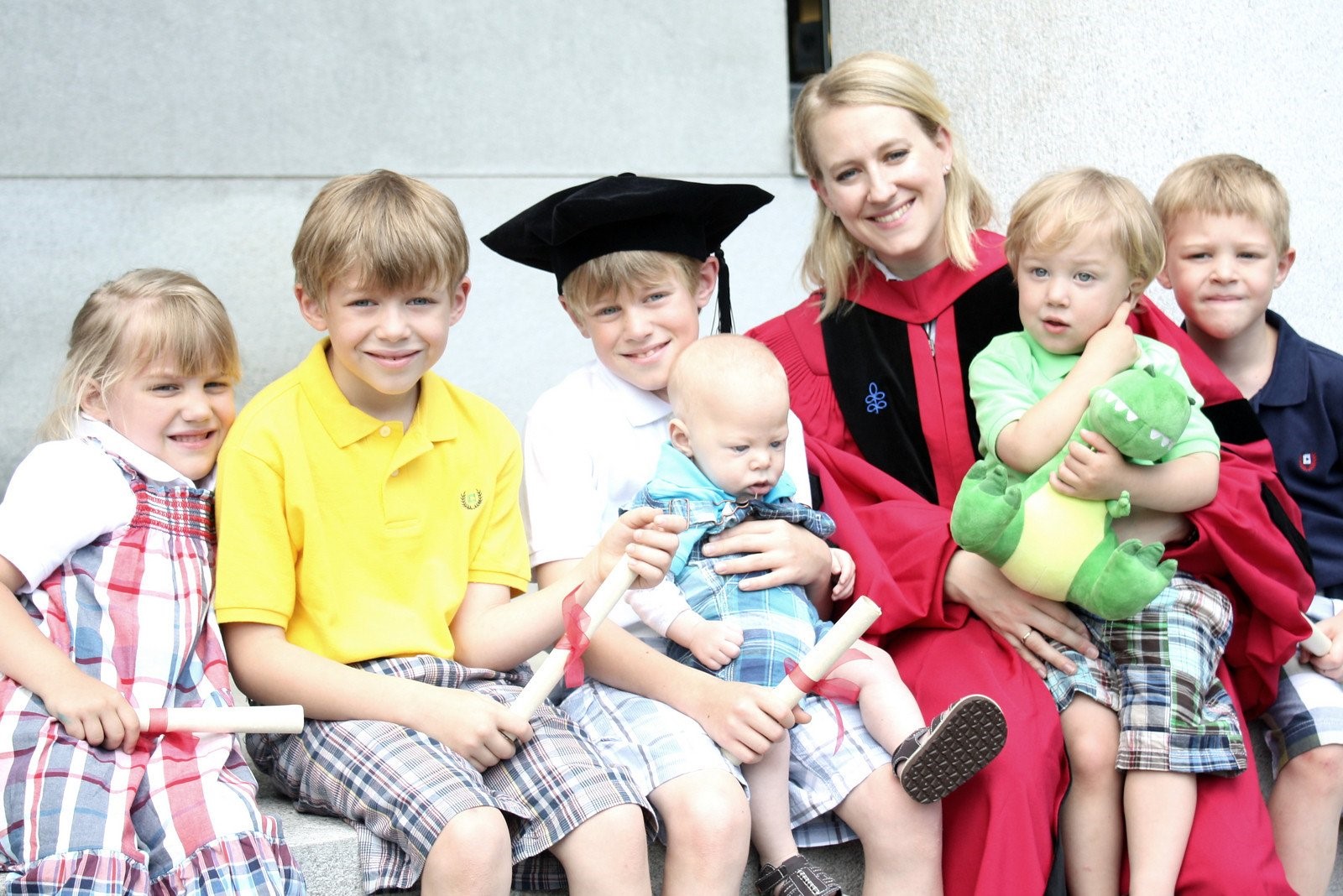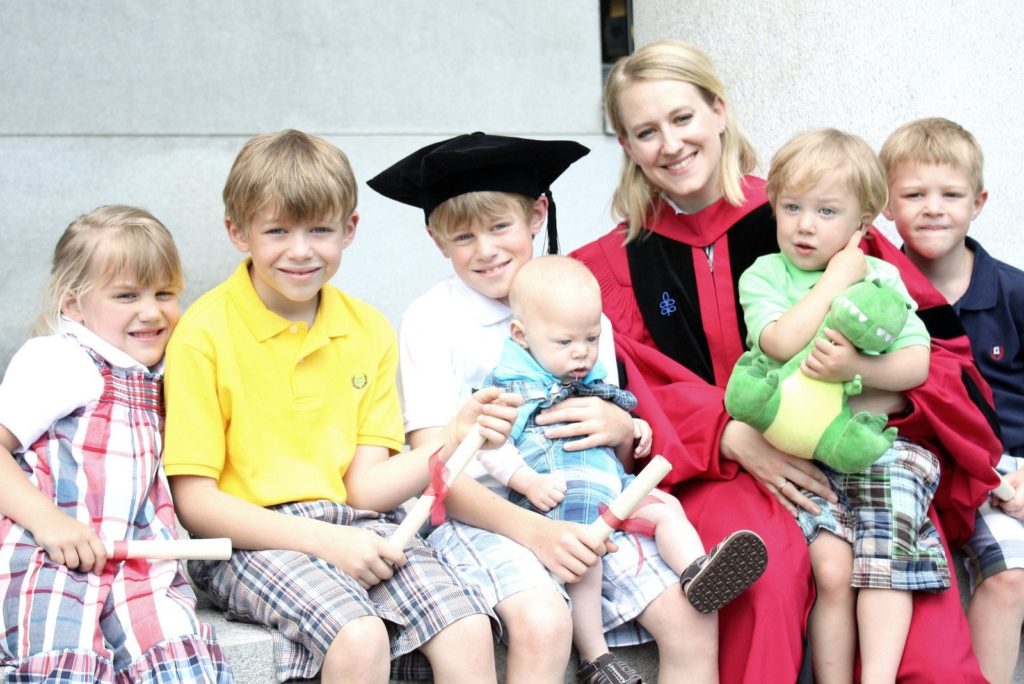Catholic University Professor’s Tweet Goes Viral in Response to French President

The photo Dr. Catherine Pakaluk posted to Twitter with six of her eight children. Courtesy of Jack D. Hardy

By Nell Rowe
Catholic University’s Dr. Catherine Pakaluk of the Busch School of Business ignited a Twitter hashtag movement in response to recent comments by France’s President Emmanuel Macron linking lack of education to higher fertility in African nations.
Macron spoke at the Bill and Melinda Gates Foundation’s ‘Goalkeepers’ event in New York on September 25-26, which is an event that promotes progress towards global goals. Macron linked the cause of women having large families in Africa to those women leaving school early.
“I always say: Present me the woman who decided, being perfectly educated, to have seven, eight or nine children,” Macron stated. He followed up with a clarification, stating that he was referring to women in impoverished countries who start having children at very young ages, not Western women who choose to have many children.
Many educated women took issue with this statement, which suggests that educated women would not decide to have many children. One of these women was Pakaluk. A mother of eight herself, Pakaluk is a professor of social research and economic thought who specializes in the economics of education and religion, Catholic social thought, political economy, and family studies and demography. She received her bachelors from the University of Pennsylvania, and her masters and Ph.D. from Harvard University.
Pakaluk’s initial tweet on October 15 linked an article about Macron’s speech from The Guardian. Her follow-up tweets include a photograph of her with six of her eight children with the hashtag, #postcardsforMacron and a list of her academic degrees. This first ‘postcard’ got 756 retweets, 2,200 likes, and brought her Twitter following up from around 300 to more than 1,600 in just the past ten days. Mothers across the country, and eventually across the world, followed suit by posting photographs of their children with captions listing their own degrees and accomplishments.
When asked about her reaction to the hashtag spreading so quickly, Pakaluk said that she thought “maybe 20 people” would react to it.
“I did not expect the reaction…it was not what I intended to do.” Pakaluk explained that the hashtag was not an angry response to Macron’s comments, but that it was somewhat an “accidental” movement that shed light on a largely unnoticed group of educated women who choose to have large families.
As for the reaction within the Twitter-sphere, Pakaluk also recognizes this as a positive reaction that says, “Hey, I exist too.” This group, she noted, is “a lot more hidden and maybe frustrated by being unnoticed.”
As for Macron’s speech as a whole, including the clarification after the extracted comments, Pakaluk said, “The simple answer is that the speech is a little bit tangled up.”
Pakaluk notes, he did clarify that he was referring to women in African nations and not Western women who choose to have large families. She also pointed out, the extracted comments are hard to agree with, even in context. “He put a good thing together with a bad thing in a way that was offensive to a lot of people, … Of course, we are all against girls being forced to get married when they are twelve. ” Still, she asked, why is he directly relating less education with high fertility? To combine the issue of less education with the idea of higher fertility is the problem most people had with Macron’s speech.
“Folks are sick and tired of that kind of casual mixing up of issues,” Pakaluk said, pointing out that “standard fertility rates in Africa are more around four children,” and even in areas in which there are higher fertility rates, there is no evidence to suggest that these rates are holding women back.
According to The World Bank Group data, the Total Fertility Rate (TFR) in Sub-Saharan Africa has dropped from 6.64 births per woman in 1960 to 4.85 in 2016.
“What we see,” Pakaluk said, “is a typical kind of convergence; when countries develop economically, we do see lower and lower rates.” Having written a majority of her dissertation on education, Pakaluk says that the general direction of Macron’s speech to promote education is something she strongly supports.
Pakaluk followed up her initial tweets with comments about the true link between education and high-fertility, stating: “What this IS about: debunking the notion that high-fertility is a consequence of ignorance. What this SHOULD be about: debunking the notion that high-fertility is an obstacle to economic growth.”
Pakaluk is currently researching the link between family and economic success. As her research is directly related to the subject of President Macron’s speech concerning high-fertility in African countries and lack of education, she is perhaps uniquely qualified to lead such a movement as #postcardsforMacron.
This was not the first time Macron landed in hot water for comments on African fertility. Speaking at the G20 summit in July 2017, Macron received criticism for claiming that the problems African nations faced today are “civilizational” and due to overpopulation from women having large families. Many accused him of overlooking the impact of former colonial powers in African nations, such as France and the UK.
Although Twitter usage is less popular in Africa, many African women have tweeted in support of the #postcardsforMacron movement, and the French news network, BFM TV tweeted a video about it.








